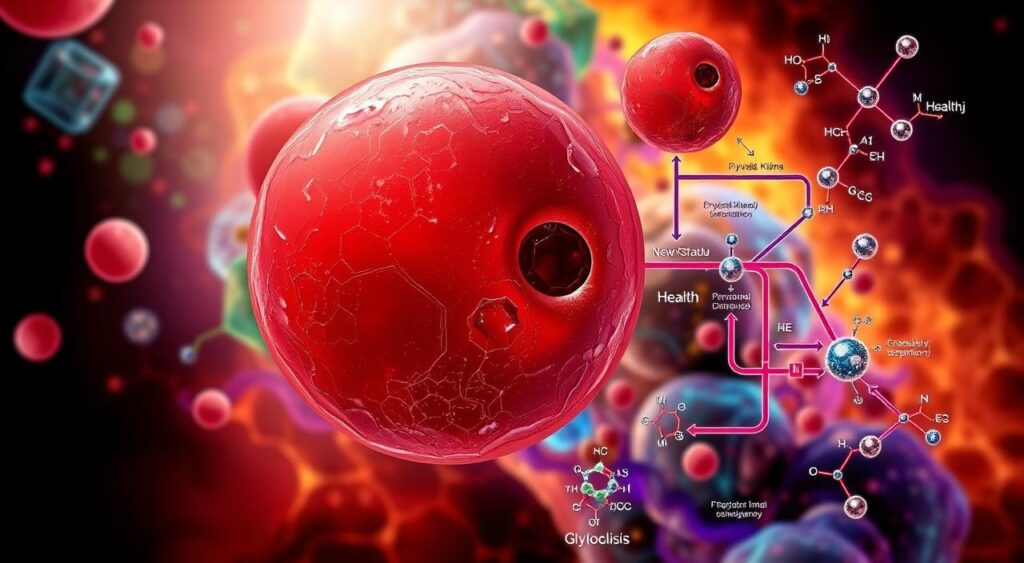About 1 in 20,000 people have pyruvate kinase deficiency. It’s a rare genetic disorder that affects how red blood cells make energy. This leads to various symptoms that can impact daily life.
Pyruvate kinase deficiency happens when the enzyme pyruvate kinase is missing. This enzyme is crucial for energy production in red blood cells. It affects people of all ages, making it important to understand this condition well.

Exploring pyruvate kinase deficiency and pkd shows we need a detailed guide. This guide will help us understand the condition better. It will provide insights for both patients and healthcare providers.
Key Takeaways
- Pyruvate kinase deficiency is a rare genetic disorder that affects 1 in 20,000 people, and is closely related to pkd.
- The condition is characterized by the deficiency of the enzyme pyruvate kinase, which is essential for energy production in red blood cells, a key aspect of pyruvate kinase deficiency.
- Pyruvate kinase deficiency can lead to a range of symptoms, from mild to severe, and affects individuals of all ages, making it essential to understand pyruvate kinase deficiency and pkd.
- Understanding pyruvate kinase deficiency is crucial for effective management and improving the quality of life for those affected by pkd.
- A comprehensive guide to pyruvate kinase deficiency and pkd is necessary to navigate the complexities of this condition, including pyruvate kinase deficiency.
- Patients and healthcare providers can benefit from valuable insights and information on pyruvate kinase deficiency and pkd, to better understand pyruvate kinase deficiency.
Understanding Pyruvate Kinase Deficiency
Pyruvate kinase disorder is a rare genetic condition. It affects the production of pyruvate kinase, an enzyme needed for energy in red blood cells. This leads to hemolytic anemia, where red blood cells are destroyed early.
Erythrocyte pyruvate kinase deficiency is a specific type of this disorder. It affects red blood cells, causing health problems.
The body needs pyruvate kinase to convert phosphoenolpyruvate to pyruvate. This process makes ATP, the cell’s main energy source. Without enough pyruvate kinase, red blood cells can’t make enough energy. This causes them to die early.
Understanding the genetic basis of pyruvate kinase disorder is key. It helps in finding better ways to diagnose and treat it.
What is PKD?
PKD, or pyruvate kinase deficiency, is a genetic disorder. It affects the production of pyruvate kinase. This can cause health issues like hemolytic anemia, jaundice, and an enlarged spleen.
PKD is usually inherited in an autosomal recessive pattern. This means a person needs two copies of the mutated gene, one from each parent, to have the condition.
The Role of Pyruvate Kinase in the Body
Pyruvate kinase is vital in the glycolytic pathway. It helps convert phosphoenolpyruvate to pyruvate. This process makes ATP, which is key for energy in red blood cells.
Without enough pyruvate kinase, red blood cells can’t make enough energy. This leads to their early destruction.
Prevalence and Demographics
Pyruvate kinase disorder is rare, affecting about 1 in 20,000 people. It’s more common in certain groups, like those of European descent.
Knowing how common pyruvate kinase disorder is helps in finding better ways to diagnose and treat it.
Genetic Basis of PKD
The genetic basis of Pyruvate Kinase Deficiency (PKD) involves a genetic mutation in the PKLR gene. This mutation can be inherited in an autosomal recessive pattern. This means an individual must inherit two mutated copies of the gene to express the condition.
The mutations disrupt the normal function of the pyruvate kinase enzyme. This leads to an enzyme deficiency. Genetic testing can identify this deficiency. It aids in the diagnosis of PKD and helps with genetic counseling for families.
- Genetic mutations in the PKLR gene are the primary cause of PKD
- The mutations can be inherited in an autosomal recessive pattern
- Genetic testing can identify the mutations and aid in diagnosis
- Genetic counseling is essential for families affected by PKD
Understanding the genetic basis of PKD is key. It helps in developing effective treatments. It also supports individuals and families affected by the condition.
| Genetic Mutation | Effect on Pyruvate Kinase Enzyme | Result |
|---|---|---|
| PKLR gene mutation | Disrupts normal function | Enzyme deficiency |
| Autosomal recessive inheritance | Requires two mutated copies | Expression of PKD |
Signs and Symptoms
Pyruvate kinase deficiency (PKD) can show different signs and symptoms. These can range from mild to severe. The main issue is hemolytic anemia, where red blood cells break down too early. This can cause jaundice, pale skin, tiredness, and shortness of breath.
Common signs of PKD include:
- Jaundice, which is a yellowing of the skin and eyes
- Pallor, or pale skin
- Fatigue, which can range from mild to severe
- Shortness of breath, particularly during physical activity
In severe cases, PKD can lead to more serious problems. These include a higher risk of gallstones because of high bilirubin levels. Also, severe hemolytic anemia might need blood transfusions to replace damaged red blood cells.
It’s crucial to spot the signs of PKD early. This ensures quick medical help and better management of the condition. Knowing the symptoms helps people deal with their diagnosis and find ways to improve their life quality.
| Symptom | Description |
|---|---|
| Jaundice | A yellowing of the skin and eyes due to elevated bilirubin levels |
| Pallor | Pale skin resulting from a decrease in healthy red blood cells |
| Fatigue | A feeling of tiredness or weakness, which can range from mild to severe |
Diagnosis Methods and Procedures
Diagnosing a rare disease like Pyruvate Kinase Deficiency (PKD) requires a few steps. These include clinical evaluation, lab tests, and genetic analysis. To spot PKD, doctors use complete blood counts and reticulocyte counts. These help check for anemia and how the bone marrow reacts.
Some key ways to find PKD include:
- Complete blood counts
- Reticulocyte counts
- Pyruvate kinase enzyme assay
- Genetic testing
These tests help doctors figure out if someone has PKD and how severe it is. This info is key for making a good treatment plan.
Genetic testing is also very important. It confirms the diagnosis and finds the exact cause of the condition. With these methods, doctors can give accurate diagnoses. This helps people with PKD manage their condition well.

Treatment Options and Management
Pyruvate kinase deficiency (PKD) needs a detailed management plan. This plan aims to ease symptoms and avoid complications. The right treatment depends on how severe the condition is and the person’s health.
For severe anemia, blood transfusions might be needed. In some cases, splenectomy (spleen removal) helps reduce red blood cell destruction. Folic acid supplements support the bone marrow in making more red blood cells.
Medical Interventions
- Blood transfusions to manage severe anemia
- Splenectomy to reduce the destruction of red blood cells
Supportive Therapies
Supportive therapies are key in managing PKD. They help ease symptoms and enhance life quality. These include folic acid supplements and other treatments to lower complication risks.
Managing PKD well needs a team effort. It involves different treatments and strategies. With the help of healthcare experts, people with PKD can get tailored care. This improves their health and well-being.
Living with Pyruvate Kinase Deficiency
Managing pyruvate kinase deficiency requires a detailed plan. People with this condition need to make lifestyle changes to live better. Eating a diet full of folate helps make red blood cells, which is key for those with this condition.
Regular exercise is good for health, but too much can make anemia worse. Drinking plenty of water and avoiding some medicines that can harm red blood cells are also important. These steps help make life with pyruvate kinase deficiency easier.
Lifestyle Adjustments
- Maintain a healthy diet rich in folate
- Engage in regular exercise, avoiding overexertion
- Stay hydrated to support overall health
- Avoid medications that can worsen hemolysis
By following these lifestyle changes, people with pyruvate kinase deficiency can manage their condition better. It’s crucial to work with healthcare providers to create a care plan. This ensures that all needs are met, helping the individual live well despite their condition.
Impact on Daily Life and Quality of Life
Living with Pyruvate Kinase Deficiency (PKD) can really affect your daily life. It can make you feel tired, short of breath, and limit what you can do. These symptoms can make everyday activities hard.
To live well with PKD, making some changes is key. Start with gentle exercise and stress-reducing activities. Also, having support from family, friends, and doctors is very important. They can help you deal with PKD’s challenges.
Here are some tips to lessen PKD’s impact on your life:
- Try low-intensity activities like yoga or walking.
- Use stress management techniques like meditation or deep breathing.
- Make sure to rest and sleep well to fight fatigue.
By adjusting your lifestyle and getting support, you can improve your life with PKD. You can manage the condition better and live more fully.
“With the right support and lifestyle adjustments, individuals with PKD can lead active and fulfilling lives.”
| Activity | Benefits |
|---|---|
| Gentle exercise | Improves physical performance, reduces fatigue |
| Stress management | Helps manage anxiety, improves overall well-being |
| Support from loved ones | Provides emotional support, helps individuals cope with challenges |
Research and Future Perspectives
Research into Pyruvate Kinase Deficiency (PKD) is making progress. This brings hope for better management and treatments. Scientists are working on new ways to treat PKD, like gene therapy and enzyme replacement therapy.
These new methods aim to fix the root cause of the condition. This is a big step forward.
Key areas of research include:
- Current clinical trials, which are investigating new treatments and therapies
- Emerging treatments, such as gene therapy and enzyme replacement therapy
- Genetic research developments, which are crucial for understanding the genetic basis of PKD and developing targeted therapies
These research advancements could greatly help people with PKD. They offer new hopes for treatment and better lives. By combining research and new treatments, we can see better outcomes and quality of life for those with PKD.

As PKD research grows, it’s important to keep up with new findings. This way, we can work towards a future where PKD is better understood. And those affected by it can get the treatments and care they need.
| Research Area | Description |
|---|---|
| Current Clinical Trials | Investigating new treatments and therapies |
| Emerging Treatments | Gene therapy and enzyme replacement therapy |
| Genetic Research Developments | Understanding the genetic basis of PKD and developing targeted therapies |
Conclusion
Pyruvate Kinase Deficiency is a rare genetic disorder that needs a detailed management plan. Knowing the disorder’s genetic roots and symptoms is key to good care. New research and treatments bring hope for better lives for those with PKD.
This guide has given a detailed look at Pyruvate Kinase Deficiency. It covers its definition, symptoms, diagnosis, treatment, and living with it. The information helps patients, families, and doctors understand and manage the disorder better. It highlights the need for a complete approach to PKD, improving life quality for those affected.
Managing Pyruvate Kinase Deficiency requires hard work, awareness, and a focus on research and education. We must push for new treatments and therapies. This way, we can give the best care to those with PKD. Together, we can make a better future for them.
FAQ
Q: What is Pyruvate Kinase Deficiency (PKD)?
A: Pyruvate Kinase Deficiency (PKD) is a rare genetic disorder. It happens when the body can’t make enough energy in red blood cells. This can cause symptoms from mild to severe and affects people of all ages.
Q: What causes Pyruvate Kinase Deficiency?
A: PKD is caused by mutations in the PKLR gene. This gene makes the pyruvate kinase enzyme. People need two copies of the mutated gene to have the condition.
Q: What are the symptoms of Pyruvate Kinase Deficiency?
A: Symptoms of PKD vary from person to person. They can range from mild to severe. Common signs include jaundice, pallor, fatigue, and shortness of breath.
Q: How is Pyruvate Kinase Deficiency diagnosed?
A: Diagnosing PKD involves several steps. First, doctors check for anemia and bone marrow response. Then, they do a pyruvate kinase enzyme assay to measure enzyme activity.
Q: What are the treatment options for Pyruvate Kinase Deficiency?
A: Treatment for PKD focuses on managing symptoms and preventing complications. This can include blood transfusions and, in some cases, removing the spleen. Supportive therapies like folic acid help the bone marrow make more red blood cells.
Q: How does Pyruvate Kinase Deficiency affect daily life and quality of life?
A: PKD can greatly impact daily life and quality of life. It can affect physical performance, energy levels, and overall well-being. Psychological support is key, as managing a chronic condition is challenging. Activities that promote health can help manage PKD’s effects.
Q: What is the current research and future perspectives for Pyruvate Kinase Deficiency?
A: Research on PKD is ongoing. It aims to find better treatments and understand the condition better. New treatments like gene therapy and enzyme replacement are being explored. Genetic research is also crucial for developing targeted therapies.
Q: Is Pyruvate Kinase Deficiency a rare disease?
A: Yes, PKD is a rare disease. It affects a small percentage of the population. But, with better awareness and genetic testing, more cases are being found. Research is ongoing to improve understanding and management of PKD.
Q: What are the complications of Pyruvate Kinase Deficiency?
A: Complications of PKD include an increased risk of gallstones and severe anemia. Untreated or poorly managed, PKD can lead to infections and organ damage.
Q: Can Pyruvate Kinase Deficiency be inherited?
A: Yes, PKD can be inherited. It follows an autosomal recessive pattern. This means an individual needs two mutated copies of the gene to have the condition. Genetic counseling is important for families with a history of PKD.
